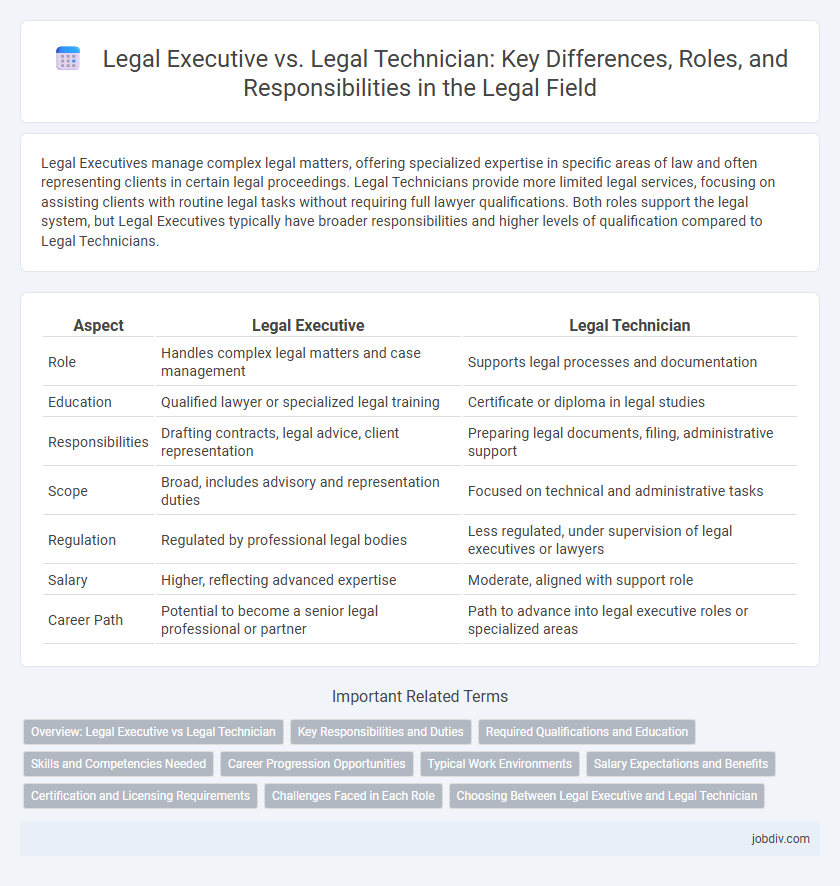Legal Executives manage complex legal matters, offering specialized expertise in specific areas of law and often representing clients in certain legal proceedings. Legal Technicians provide more limited legal services, focusing on assisting clients with routine legal tasks without requiring full lawyer qualifications. Both roles support the legal system, but Legal Executives typically have broader responsibilities and higher levels of qualification compared to Legal Technicians.
Table of Comparison
| Aspect | Legal Executive | Legal Technician |
|---|---|---|
| Role | Handles complex legal matters and case management | Supports legal processes and documentation |
| Education | Qualified lawyer or specialized legal training | Certificate or diploma in legal studies |
| Responsibilities | Drafting contracts, legal advice, client representation | Preparing legal documents, filing, administrative support |
| Scope | Broad, includes advisory and representation duties | Focused on technical and administrative tasks |
| Regulation | Regulated by professional legal bodies | Less regulated, under supervision of legal executives or lawyers |
| Salary | Higher, reflecting advanced expertise | Moderate, aligned with support role |
| Career Path | Potential to become a senior legal professional or partner | Path to advance into legal executive roles or specialized areas |
Overview: Legal Executive vs Legal Technician
Legal Executives typically hold advanced legal qualifications and manage complex legal tasks such as drafting contracts, providing legal advice, and representing clients in specific cases, often requiring a formal certification or licensing. Legal Technicians focus on assisting with routine legal processes, document preparation, and administrative support under supervision, usually involving less rigorous certification requirements. The distinction lies in the scope of responsibility, level of expertise, and the ability to independently handle legal matters.
Key Responsibilities and Duties
Legal Executives specialize in complex legal matters such as contract drafting, case management, and client representation, often handling litigation support and providing legal advice under supervision. Legal Technicians focus primarily on assisting with routine legal processes, conducting legal research, preparing legal documents, and maintaining case files, ensuring compliance with procedural requirements. Both roles enhance legal service efficiency, with Legal Executives undertaking higher-level responsibilities and Legal Technicians supporting administrative and preparatory tasks.
Required Qualifications and Education
Legal Executives typically require a professional legal qualification such as the Chartered Institute of Legal Executives (CILEx) level 3 and level 6 diplomas, along with relevant work experience in the legal field. Legal Technicians usually need a diploma or certificate in paralegal studies or legal technology, emphasizing practical skills over extensive legal theory. Higher education for Legal Executives often includes specialized legal training, whereas Legal Technicians focus more on technical knowledge applicable to legal support roles.
Skills and Competencies Needed
Legal Executives require in-depth knowledge of legal principles, strong analytical abilities, and proficiency in drafting and reviewing legal documents, along with excellent client communication and case management skills. Legal Technicians focus on practical application of legal procedures, attention to detail in maintaining records, and competence in using legal software and research tools to support attorneys efficiently. Both roles demand a solid understanding of legal terminology, ethical standards, and the ability to work collaboratively within a legal team.
Career Progression Opportunities
Legal Executives often have broader career progression opportunities compared to Legal Technicians due to their advanced qualifications and ability to handle complex legal matters, including advocacy and case management. Legal Technicians typically focus on specific legal tasks under supervision, limiting their upward mobility without further education or certification. Pursuing additional credentials or transitioning to Legal Executive roles enhances prospects for leadership positions and specialized legal expertise.
Typical Work Environments
Legal Executives typically work in law firms, corporate legal departments, and government agencies where they handle complex legal matters and case management. Legal Technicians are often found in legal clinics, community organizations, and smaller law offices, providing technical support and assisting with specific legal processes. Both roles require collaboration with lawyers and clients, but Legal Executives usually operate in more formal, high-stakes environments.
Salary Expectations and Benefits
Legal Executives typically command higher salary expectations than Legal Technicians due to their advanced qualifications and broader scope of responsibilities, with median annual earnings ranging from $70,000 to $90,000 depending on jurisdiction and experience. Legal Executives often receive comprehensive benefits packages, including health insurance, retirement plans, and performance bonuses, reflecting their senior role within legal departments or firms. Conversely, Legal Technicians usually earn between $40,000 and $60,000 annually, with more limited benefits focused on basic health coverage and minimal retirement contributions.
Certification and Licensing Requirements
Legal Executives typically require certification from recognized professional bodies such as CILEx (Chartered Institute of Legal Executives) in the UK, which involves completing accredited legal qualifications and accumulating practical experience. Legal Technicians often need state-specific licensing that mandates passing a specialized exam and fulfilling educational prerequisites tailored to limited legal scope tasks. Certification for Legal Executives tends to offer broader practice rights, while Legal Technicians face more restricted licensing geared towards assisting roles within legal services.
Challenges Faced in Each Role
Legal Executives often encounter challenges in managing complex case law research and navigating intricate regulatory frameworks, requiring advanced analytical skills and continuous professional development. Legal Technicians face difficulties in balancing extensive client communication with the technical accuracy needed for document preparation and procedural compliance. Both roles demand meticulous attention to detail but differ in scope, with Legal Executives handling more strategic legal decision-making and Legal Technicians focusing on practical, operational support within legal processes.
Choosing Between Legal Executive and Legal Technician
Choosing between a Legal Executive and a Legal Technician depends on the scope of legal services required and the level of expertise needed. Legal Executives typically handle complex legal matters, offer representation, and provide strategic advice within specific law areas, whereas Legal Technicians specialize in assisting with defined legal tasks under supervision. Understanding the differences in qualifications, regulatory authority, and fee structures is crucial for selecting the right legal professional to meet specific client needs.
Legal Executive vs Legal Technician Infographic

 jobdiv.com
jobdiv.com